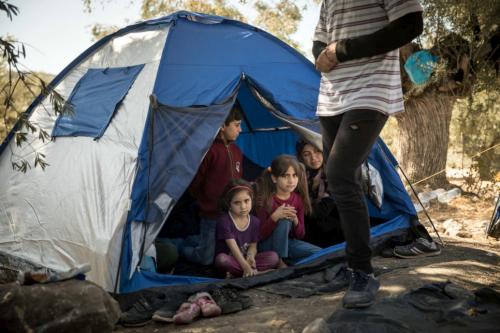European States urged to do more to protect and support child refugees and migrants
European States must step up their efforts to protect child refugees and migrants who have endured not only difficult and dangerous journeys but continue to face risks and hardship once in Europe, including unsafe accommodation, being incorrectly registered as adults, and a lack of appropriate care, UNHCR, the UN Refugee Agency, has urged.

A Syrian family from Idlib recently arrived on the Greek island of Lesvos and living in an olive grove next to Moria reception centre.
UNHCR’s latest Desperate Journeys report, published, on October 14, notes that from January to September 2019, some 80,800 people arrived in Europe via Mediterranean routes – down from 102,700 in the same period of 2018. Of those who arrived, more than a quarter were children, many travelling without their parents.
“These children may have fled conflict, lost family members, been away from home for months, even years, with some enduring horrific abuses during their journeys, but their suffering doesn’t stop at the border,” said Pascale Moreau, Director of UNHCR’s Europe Bureau. “Across Europe, unaccompanied children in particular are frequently housed in large centres with minimal oversight, exposing them to further abuse, violence and psychological distress and increasing the risk that they will move on or disappear.”
Greece has received the majority of arrivals across the Mediterranean region this year – more than Spain, Italy, Malta, and Cyprus combined. So far, more than 12,900 children have arrived in Greece by sea, including almost 2,100 unaccompanied or separated children, many of them from Afghanistan, Syria and other countries characterized by conflict and violence. Conditions in overcrowded and unsanitary reception centres on the Greek Aegean islands are hugely concerning.
The Greek authorities have announced measures to alleviate overcrowding and there are positive examples of best practice models being implemented, including community-based foster care. However, as of the end of September, most unaccompanied children in Greece were still in unsuitable accommodation. Given the extremely risky conditions they face, UNHCR appeals to European States to open up places for their relocation as a gesture of solidarity and speed up transfers for children eligible to join family members.
While there have been many positive steps across Europe towards improving protection, the report notes that more needs to be done to address some of the challenges children continue to face. Among its recommendations, the report calls on European States to urgently end the use of immigration detention for children, appoint trained guardians or social workers and ensure that refugee and migrant children can receive an education. Across Europe, children may also struggle to be recognised as a child and the report calls for holistic and multi-disciplinary methods to be used when assessing a child’s age.
By taking the steps outlined in this report, States will be able to increase the protection given to children on the move and be better equipped to determine how their best interests can be met, which may include solutions outside Europe.
Source: United Nations High Commissioner for Refugees
- 199 reads
Human Rights
Ringing FOWPAL’s Peace Bell for the World:Nobel Peace Prize Laureates’ Visions and Actions

Protecting the World’s Cultural Diversity for a Sustainable Future

The Peace Bell Resonates at the 27th Eurasian Economic Summit

Declaration of World Day of the Power of Hope Endorsed by People in 158 Nations

Puppet Show I International Friendship Day 2020

